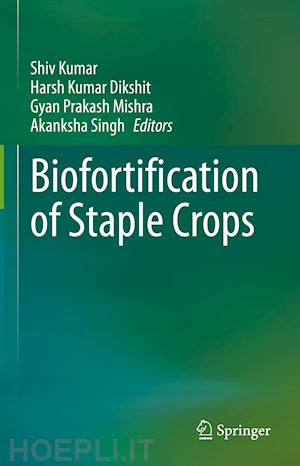
Questo prodotto usufruisce delle SPEDIZIONI GRATIS
selezionando l'opzione Corriere Veloce in fase di ordine.
Pagabile anche con Carta della cultura giovani e del merito, 18App Bonus Cultura e Carta del Docente
This edited book brings together comprehensive information on various aspects of the biofortification of staple crops. It addresses the present status of food and nutritional security and highlights the importance of micronutrients in human health, a historical account of biofortification, current approaches and challenges, crop-specific biofortification efforts and various breeding approaches, including conventional, and genomics enabled improvement.
It also explains the efficacy of biofortification, bioavailability, and future thrust. It is an inclusive source of information on different aspects of micronutrients in crops of global importance.
Malnutrition is a serious global issue, with millions of people being undernourished, several suffering from micronutrient deficiencies, and the adult population struggling with obesity. Despite significant economic progress, South Asia and Sub-Saharan Africa are still home to an undernourished population. Nutrition-related health problems are related to hidden hunger and are widespread in the developing world. Women and preschool children are more vulnerable. Even though global food production has increased manifolds, estimates indicate that over 60% of the world’s population is deficient in essential micronutrients such as iron, zinc, iodine, and selenium, often causing health problems and developmental delays. Linking agricultural production with human nutrition and health is crucial for ensuring nutrition security. Much research has been carried out to assess genetic diversity related to micro-nutrients in staple crops, their bioavailability, and the efficacy of biofortified germplasm. Biofortified varieties developed in different crops through conventional breeding are being up-scaled for reducing the micronutrient deficiencies in other countries.
This book is a ready reference for researchers, academicians, extension personnel, policymakers, students, and value chain stakeholders engaged in agriculture, nutrition, and health sectors promoting nutrition-sensitive diets.
Dr. Shiv Kumar leads ICARDA’s Food Legumes Program delivering improved germplasm of lentil, kabuli chickpea, faba bean, and grass pea to national partners in South Asia, Sub-Saharan Africa, West Asia, and North Africa. He works on developing short- duration, climate-smart varieties of lentil and grass pea, with high iron and zinc content for the sustainable intensification of cereal-based cropping systems. During his three-decade career he has worked with national and international partners to develop 39 lentil, five mungbean, two urdbean, one rice, and three grass pea varieties. He has published 196 peer-reviewed journal articles, 77 book chapters, ten books, seven technical bulletins, and two training manuals. He also supervises teaching and training of national partners. He has done his master’s and PhD in Plant Breeding from G.B.P.U.A. & T. Pantnagar (India).
Dr. Harsh Kumar Dikshit is serving as Principal Scientist at ICAR-Indian Agricultural Research Institute, New Delhi (India). He is working on genetic improvement of grain legumes through conventional and molecular approaches. He has developed fifteen varieties of different grain legumes (lentil, mungbean and dry beans) for cultivation in India. His present focus is on basic and applied research on Biofortification and biotic stresses of lentil and mungbean. He is faculty of Division of Genetics and is involved in teaching of different courses and thesis research guidance to post graduate students. He has done his master’s and PhD in Plant Breeding from G.B.P.U.A. & T. Pantnagar (India).Dr. Gyan Prakash Mishra is currently working as Principal Scientist at ICAR-Indian Agricultural Research Institute, New Delhi (India). Before that he has worked at DRDO-Defence Institute of High Altitude Research, Leh (India) as Scientist ‘C’, ICAR-Directorate of Groundnut Research, Junagadh (India) and ICAR-Indian Institute of Vegetable Research, Varanasi (India) as Senior Scientist. His major research interest includes crop improvement through conventional, molecular and transgenics approaches. He has done his master’s and PhD in Genetics from Indian Agricultural Research Institute, New Delhi (India) and postdoc from University of California, Riverside and Purdue University, USA as BOYSCAST-Fellow.
Dr. Akanksha Singh is working as Assistant Professor at Amity Institute of Organic Agriculture, Amity University, Noida (India). Her research areas include characterization of Lens species for grain Fe and Zn and association mapping and development of genetic and genomic resources. She has published around 23 research papers in reputed journals. She has contributed in development of lentil varieties for central India and registration of biofortified lentil germplasm L 4704 (Fe and Zn rich). She received Babu Jag Jivan Ram Memorial Gold Medal and Chancellor’s Silver Medal from Bundelkhand University, Jhansi for her master’s degree. She has done PhD in Biotechnology from Banasthali University, Banasthali (India).











Il sito utilizza cookie ed altri strumenti di tracciamento che raccolgono informazioni dal dispositivo dell’utente. Oltre ai cookie tecnici ed analitici aggregati, strettamente necessari per il funzionamento di questo sito web, previo consenso dell’utente possono essere installati cookie di profilazione e marketing e cookie dei social media. Cliccando su “Accetto tutti i cookie” saranno attivate tutte le categorie di cookie. Per accettare solo deterninate categorie di cookie, cliccare invece su “Impostazioni cookie”. Chiudendo il banner o continuando a navigare saranno installati solo cookie tecnici. Per maggiori dettagli, consultare la Cookie Policy.